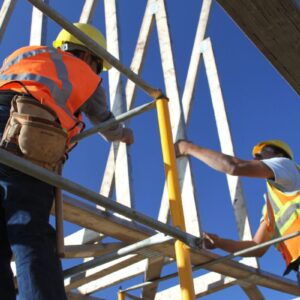
Public libraries have always been an accessible institution for many Americans, located just around the corner and respected for their wealth of books and knowledge. But now, more than ever, we can appreciate how fiercely libraries strive to represent our values in their pursuit of authentic democracy.
“A library card and the library itself is more than access to books. It’s a statement of belief in community and democracy.”
From the stories on their shelves to the workshops they host, public libraries aim to serve their communities. They expand civic engagement to everyone, including young children and marginalized groups, who choose to use the library’s services. It is not an opportunity one should take for granted—especially if they are feeling powerless or misrepresented in federal politics.
The simple act of getting or renewing a library card can have a large impact on your local library. Not only can it boost local government funding, keeping the library’s resources flourishing for everyone, but it displays strong community support.
“At a time when people are more divided and disconnected than ever, libraries remain places where anyone—regardless of background, politics, or income—can walk through the door and feel a sense of belonging,” Brooks Rainwater, the president and CEO of the Urban Libraries Council, told NPQ. “A library card and the library itself is more than access to books. It’s a statement of belief in community and democracy.”
Why Libraries Matter, Beyond the Bookshelves
Even individual branches within one large urban library system can offer vastly different services tailored to local patrons, Rainwater explained. For example, while the Brooklyn Public Library’s Coney Island branch prioritizes health and food distribution services, the Sheepshead Bay branch regularly hosts social gatherings as an event space.
Rainwater emphasized that libraries prioritize equity and support underserved and marginalized populations. They provide some people’s sole access to reliable digital information—an increasingly necessary resource in the current world—and career resources, like job training and financial literacy programming.
“It creates a very unique space where something like social service delivery or public health delivery can be done directly in the library,” Rainwater said. “There’s a number of libraries that have social workers that are working within the library, trying to work together with the housing and homelessness services within a city or county so that they’re able to provide those resources that unhoused people need when they come into a library.”
Libraries have frequently transformed into vital places during times of crisis, including as emergency shelters during climate crises and offering substance abuse resources during the opioid epidemic.
However, independent of organized programming, local libraries inherently help deconstruct barriers of inequity by serving as authentically public spaces. They provide free access to bathrooms, air conditioning, technology, meeting spaces, and more to all visitors.
Kelly Linehan, who works at the Waltham Public Library in Waltham, MA, and serves as vice president of the Massachusetts Library Association, said that library cardholders in her state have increased steadily in the past few years. Although this trend may seem counterintuitive given that more people have personal devices and internet connectivity each year, Linehan said that many people come to libraries as a communal space above all else.
“It’s just that really for many people, the library is about a sense of community,” Linehan said in an interview with NPQ. “For many of our patrons, they come in and we might be the only faces, the only people, that they engage with on a day-to-day basis.”
Independent of organized programming, local libraries inherently help deconstruct barriers of inequity by serving as authentically public spaces.
Public libraries receive over 80 percent of their revenue from local government; around 1 percent of funding from the federal government; and revenue from individual, foundation, and corporate donors to fund diverse programs. Library members’ influence on their local libraries’ initiatives cannot be ignored, as they vote on city budget proposals, communicate their desires for their library as a community space, and more.
Linehan stressed the importance of getting a library card, calling it a “profoundly civic act” that serves as the most valuable investment in a library. She said that a public library embodies what American democracy should look like, and thus, having a library card symbolizes support for the practice in its truest form.
“It’s a small piece of plastic that really represents this idea of free access to information, lifelong learning, and this mentality that everyone collectively deserves the same access to these tools to participate in our society,” Linehan said. “We work so hard as public servants to promote these ideals of access for people that it really can’t be understated how important it is to carry a library card.”
The Trump Administration’s Target on Libraries
In recent months, the United States has seen fundamental democratic principles come under attack, including the rollback of various civil rights protections, the upheaval to checks and balances, increased partisan interference in voting district maps, and more. While that reality allows us to better appreciate the authenticity of libraries’ values, these institutions are also not safe from massive cuts and threats.
In March, President Donald Trump moved to dismantle the Institute of Museum and Library Services (IMLS), a government agency that supports 125,000 public libraries with funding for widespread internet access, public computers, and more. Trump proceeded to put the entire IMLS staff on leave, terminated grants and contracts, and appointed a new director who promised to lead the IMLS “in lockstep with this Administration.”
Although Congress rejected the Trump administration’s proposals to slash the IMLS every year of his first term, Trump’s budget plan for fiscal year 2026 again proposes to terminate the agency.
While the American Library Association (ALA) joined 21 states in suing the Trump administration for attempting to dismantle the IMLS, the attacks have already hit local libraries hard. Maine laid off around 20 percent of its state library’s staff after losing IMLS funding, and other states’ libraries have had to halt programming and services. ALA President Cindy Hohl said in an interview with NPQ that small and rural communities would face the “greatest impact” from the funding cuts, as their libraries are much more dependent on federal funding with insufficient local and state funds.
Linehan said that libraries are nonpartisan intuitions who have been “dragged into” these political battles, such as those surrounding book-banning initiatives. According to a national ALA poll, almost everybody in the country—regardless of political party—agrees that public libraries play an important role in communities.
Interestingly, this common viewpoint comes in an era where polarization is rampant in the United States. The Pew Research Center found that 80 percent of Americans think voters on opposite sides cannot agree on basic facts, as well as that most Americans said nationwide attention ignores important issues in favor of disagreements between Democrats and Republicans.
“Librarians, we have no political agenda,” Linehan said. “We are here to serve everyone, and we’re really coming from a place of anti-censorship. Our real goal is to meet people where they are and help remove any obstacle that would prevent someone from accessing any type of informational needs or services at the library.”
When organizations provide their services in tandem with libraries…it ensures that services are centralized and are not unnecessarily spread too thin.
Power in Partnerships
Beyond the financial support that nonprofits can provide their public libraries, there is a lot of potential in these partnerships. Collaborations between libraries and nonprofits, city agencies, and other organizations help make efficient and meaningful contributions to the communities they serve.
For example, Linehan explained that the Waltham Public Library can offer meals and snacks to children through its partnership with the Waltham Boys & Girls Club, helping students have healthier school and library experiences. Other examples include Atlanta- and Baltimore-based libraries’ collaboration with Vision to Learn to provide vision care for underserved youth, and Roanoke County Public Library branches serving as a drive-through window so residents could make in-person tax payments during the COVID-19 pandemic.
Both Linehan and Rainwater discussed how libraries working with nonprofits and city agencies, rather than simply alongside them, is important in order to maximize community resources. When organizations provide their services in tandem with libraries, who are already serving so many patrons, it ensures that services are centralized and not unnecessarily spread too thin.
“We try to bring in the organizations with a little bit more nuance to act as a connector for our patrons and those resources, and offer a safe and welcoming space where they can work together and have access to a computer and a printer and feel secure in being able to meet here,” Linehan said. “We’ve only started to scratch the surface of what that potential collaboration could look like.”














